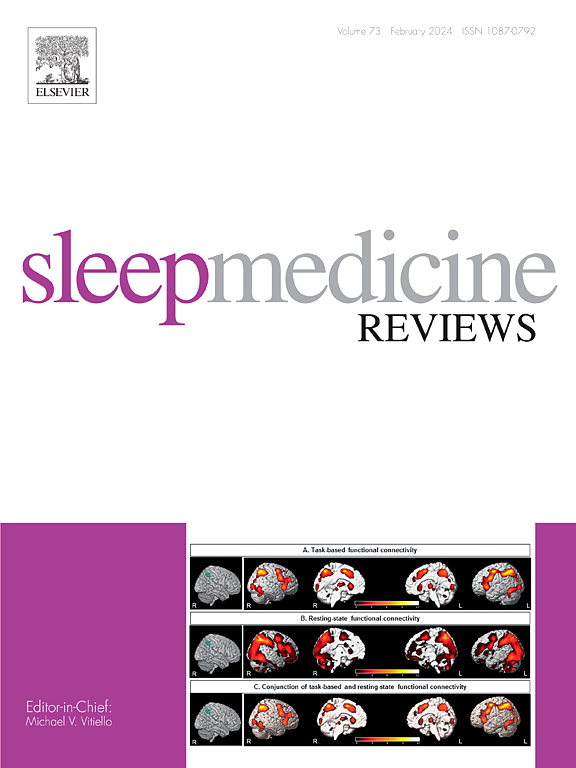睡眠时间对儿童日间嗜睡的影响:一项荟萃分析。
IF 9.7
1区 医学
Q1 CLINICAL NEUROLOGY
引用次数: 0
摘要
虽然之前的研究已经发现,较短的睡眠时间与儿童较差的认知能力有关,但尚不清楚与充足或延长的睡眠相比,较短的睡眠时间是否会增加白天的嗜睡。对文献的系统检索确定了17项研究纳入meta分析。当排除两项睡眠剥夺研究时,与充足或延长的睡眠时间相比,短睡眠时间与较高的日间嗜睡相关,标准化平均差异:0.74 (95% CI 0.45; 1.02)。与充足/延长睡眠时间组相比,短睡眠组的睡眠限制程度有很大差异。这是一个显著的调节因子,占效应量的7%。与青少年相比,儿童的效应值更低,这表明青少年特别容易受到短睡眠的影响。对于个体研究,标准化平均差异具有很宽的置信区间,这表明与充足睡眠时间相比,短睡眠时间的反应存在实质性的个体间差异。需要进一步的研究来确定白天嗜睡是否介导了睡眠持续时间和认知结果之间的关系。本文章由计算机程序翻译,如有差异,请以英文原文为准。
Impact of sleep duration on daytime sleepiness in children: A meta-analysis
Whilst previous reviews have identified that shorter sleep duration is associated with poorer cognition in children, it is not known whether short sleep duration increases daytime sleepiness compared with sufficient or extended sleep. A systematic search of the literature identified 17 studies to be included in the meta-analysis. When excluding two sleep deprivation studies, short sleep duration was associated with higher daytime sleepiness compared with sufficient or extended sleep duration, standardised mean difference: 0.74 (95 % CI 0.45; 1.02). There was substantial variation in the extent of sleep restriction in the short sleep duration group compared to the sufficient/extended group. This was a significant moderator, accounting for 7 % of the effect size. As the effect size was lower for children compared to adolescents, it suggests that adolescents are particularly vulnerable to the effects of short sleep. For individual studies, the standardised mean difference had wide confidence intervals, suggesting that there are substantial inter-individual differences in response to short sleep duration compared to sufficient sleep duration. Further research is needed to identify whether daytime sleepiness mediates the relationship between sleep duration and cognitive outcomes.
求助全文
通过发布文献求助,成功后即可免费获取论文全文。
去求助
来源期刊

Sleep Medicine Reviews
医学-临床神经学
CiteScore
20.10
自引率
3.80%
发文量
107
期刊介绍:
Sleep Medicine Reviews offers global coverage of sleep disorders, exploring their origins, diagnosis, treatment, and implications for related conditions at both individual and public health levels.
Articles comprehensively review clinical information from peer-reviewed journals across various disciplines in sleep medicine, encompassing pulmonology, psychiatry, psychology, physiology, otolaryngology, pediatrics, geriatrics, cardiology, dentistry, nursing, neurology, and general medicine.
The journal features narrative reviews, systematic reviews, and editorials addressing areas of controversy, debate, and future research within the field.
 求助内容:
求助内容: 应助结果提醒方式:
应助结果提醒方式:


